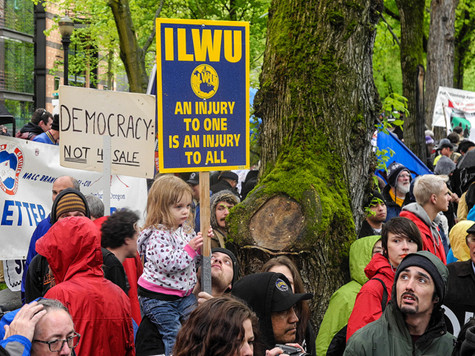
Americans are bracing for chaos in their holiday travel and shopping this week, as labor unions are planning strikes and protests across areas of the country that are likely to cause major troubles during one of the busiest weeks of the year. The SEIU shut down traffic at the Los Angeles airport on Thanksgiving eve and a union-backed advocacy group plans to protest Walmart on Black Friday. And now, reports of worker strikes at West coast ports predict resulting snarls in the supply chain, disrupting deliveries of everything from food to gifts, just in time for the holidays.
Longshore union members at ports in Portland, Oregon and Los Angeles and Long Beach, California are expected to strike during the holiday week over unsettled contract negotiations between workers and the various international shipping companies that employ them. Effected union members include marine terminal security guards, office and clerical workers, and custodial and maintenance workers. While dockworkers aren’t necessarily part of those strikes, such workers may also refuse to cross picket lines in solidarity with other union members, as was already the case in California. Major carriers are planning to divert freighters from the Port of Portland in advance of a strike planned for Sunday.
Custodial and maintenance workers represented by SEIU at Oakland’s port returned to work Wednesday after a one day strike, during which mayor Jean Quan convinced the parties to return to the bargaining table to resume negotiations. But many worry that a strike could still be looming over that port.
Representatives for the International Longshore and Warehouse Union (ILWU), an AFL-CIO member union, say that technology is enabling companies to outsource jobs overseas, which remains a primary impasse in negotiations. In Long Beach, California, the union had refused to accept the latest proposal, not because of pay – the proposed increase will bring the average worker’s annual salary to $90,000 – but because it does not want employers using technology that it says will lead to union job attrition, according to the Journal of Commerce (mirror post here for non-subscribers).
Shipping lines and terminal operators who are represented by the Harbor Employers’ Association said they offered to guarantee the OCU “absolute job security” for existing workers, a guaranteed work week and a $1-an-hour pay increase that will raise average annual earnings to $90,000 per worker.
Fageaux, while acknowledging those financial points, said the reason why the OCU rejected the contract proposal is that employers insist on using technology to open the companies’ electronic portals to non-OCU workers in the U.S. or countries overseas.
That policy would lead to attrition of OCU jobs, and once those positions are lost, they will be gone forever, he said. “This isn’t about economics. It’s about job preservation,” he said. In effect, the membership of the OCU would continue to shrink as existing workers retired, he said.
Some union members also complain that technology itself jeopardizes jobs by automating some of the work previously performed manually by workers covered under old union contracts.
This is not unlike the logic behind the criticism of Automated Teller Machines (ATMs) and the argument that technology replaces human workers and destroys jobs, despite the fact that automation – in banking and in most industries – has often proven to create more jobs over time, usually better ones at that.
An earlier strike this year on the East Coast was delayed in October for 90 days, in part to avert any negative impact on the election.
George H. Cohen, director of the Federal Mediation and Conciliation Service, said “progress was made on several important subjects,” prompting both sides to agree to an extension through Dec. 29 — after the elections and the holiday season.
“In taking this significant step, the parties emphasized that they are doing so for the good of the country to avoid any interruption in interstate commerce,” Cohen said in a statement.
Indeed, Obama intervened in that same strike, calling parties back to the table to negotiate through the Federal Mediation and Conciliation Service just prior to the Democratic National Convention.
The mediation service, created under the Taft-Hartley Act of 1947, is an independent agency charged with minimizing the impact of private-sector labor disputes on commerce through mediation or voluntary arbitration. The agency helped end a 10-day West Coast ports closing in 2002 that cost the national economy an estimated $1 billion a day. The current director, Cohen, is a 2009 Obama appointee.
Word of the federal mediation agency’s intervention came hours before Obama was expected to defend his record on the economy in a speech at the Democratic National Convention, where he would accept his party’s nomination for re-election.
But the election is over now, and relief for travelers and shoppers does not seem to be immediately forthcoming.
Calling the allegations “complex,” the National Labor Relations Board said it does not expect to have a decision by Friday on whether or not Walmart may stop the protests planned for Friday. Walmart filed for an injunction, claiming the union protests are “illegal picketing.” SEIU’s Thanksgiving eve protest kicked off as planned, resulting already in several arrests. And earlier Wednesday, a judge denied the Port of Portland’s request for an emergency injunction to stop the strike in Oregon.
Given that protesters with the Occupy movement last year called for a West coast port shut-down and successfully blocked Oakland’s port at the time, concerns also remain that activists could further exacerbate any strike or protest activities this week and during the remainder of the holiday season.

COMMENTS
Please let us know if you're having issues with commenting.